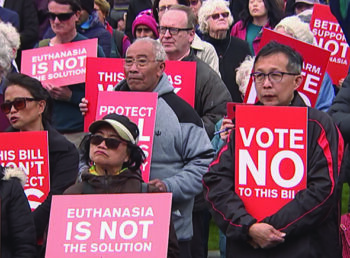New Zealand General Election 19 September 2020
The Recreational Cannabis Referendum
The referendum is about whether or not to make recreational cannabis legal.
The choice
Voters are asked to choose
“Yes. I support the proposed Cannabis Legalisation and Control Bill”,
or
“No. I do not support the proposed Cannabis Legalisation and Control Bill”.
What happens as a result?
If more than 50% of voters vote “No”, cannabis will remain illegal.
If more than 50% of voters choose “Yes”, the government has said that it will bring in “legislation that is closely modelled on a draft Bill”.
The draft Bill
The draft Bill deals with “possession, use, supply and growth of cannabis for recreational purposes”.
The proposed new law aims, by various means, “to regulate and control the cultivation, manufacture, use and sale of cannabis in New Zealand, with the intent of reducing harms from cannabis use to individuals, families, whānau and communities”.
Legalisation would remove all legal restrictions against the use of cannabis and control its strength, production and supply.
Medicinal cannabis
Medicinal cannabis is already legal under the Medicinal Cannabis Scheme.
The draft Bill does not cover medicinal cannabis, hemp, driving while impaired, or workplace health and safety issues. These are covered by existing laws.
Decriminalising cannabis
• The referendum does not offer the option of decriminalising cannabis.
• Decriminalisation would mean that the drug would remain illegal, but a person would not be prosecuted for possessing cannabis under a specified amount. “Instead, penalties would range from no penalties at all, civil fines, drug education or drug treatment”.
• Deciminalisation opens the way for a health-based approach that treats addiction and reduces demand.
• Voting “No” allows for the possibility of decriminalisation in the future.
The Catholic position
• Legalising cannabis in overseas countries has not put an end to black-market supply of the drug, because legally produced supplies cost more, and
• Legalising cannabis for those over 20 will enable those under 20 to access the drug more easily, just as adolescents at present get alcohol and tobacco from friends and family members rather than from retailers.
• Before the 2017 General Election, the New Zealand Catholic Bishops stated that moves to legalise ‘soft’ drugs and other substances – which wreak havoc in particular sectors of our society – are a deeply cynical and cheap way of side-lining a complex social ill that needs to be addressed creatively and resolutely.
The End of Life Choice Bill Referendum
The referendum is about the End of Life Choice Act 2019 coming into force.
The choice
Voters are asked to choose
“Yes. I support the End of Life Choice Act 2019 coming into force”.
or
“No. I do not support the End of Life Choice Act 2019 coming into force”.
What happens as a result?
If more than 50% of voters vote “No”, the End of Life Choice Act will not come into force.
If more than 50% of voters choose “Yes”, the End of Life Choice Act will come into force 12 months after the date the final votes are counted.
The End of Life Choice Act
• In the Act, ‘assisted dying’ means “a person’s doctor or nurse practitioner giving them medication to relieve their suffering by bringing on their death; or the taking of medication by the person to relieve their suffering by bringing on death”.
 • In the Act, ‘medication’ means “a lethal dose of the medication used for assisted dying”.
• In the Act, ‘medication’ means “a lethal dose of the medication used for assisted dying”.
• The Act sets out details regarding eligibility for assisted dying, ability to make an informed decision about assisted dying, ensuring that the choice is made freely and the process to be followed.
The Catholic position
• Assisted dying is in direct opposition to Christian belief that all life is sacred and that God created us in his own image and likeness.
• The Act provides only one choice; it does not provide for a choice of good palliative care.
• Options are available in palliative care to bring pain relief for those suffering extreme pain.
• The vulnerable and the elderly deserve safe and ongoing care rather than being made to feel they are a burden; they are not, and it is a Christian duty as well as a privilege to afford them the best care possible.
• “The negative attitudes which euthanasia breeds in society towards those who most need our care, attitudes which are being increasingly openly expressed, will harm all of us, in particular our elders” [Dr Sinéad Donnelly].
• “We know exactly how euthanasia will grow and the harm it will do. We have watched what it has done in countries where the germ of the idea was first seeded. It needs to be contained now, and in New Zealand we still have a chance to do that” [ibid].
 Entries(RSS)
Entries(RSS)